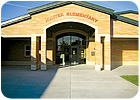
In planning for its newest elementary school, the Joint School District #2 of Meridian, ID, required a high-efficiency HVAC system that would also be easy to maintain. A low-temperature hydronic system featuring condensing boilers was selected to economically serve the school's needs for years to come.
The Joint School District #2 of Meridian, ID, serves over 30,000 students and is one of the largest and fastest growing school districts in Idaho. When the district was in the process of designing its newest elementary school - Hunter Elementary - it was looking to stretch its heating dollars as far as it could.
When it came to the school's boiler needs, the district required a high-efficiency system that would also be easy to maintain. The answer was a state-of-the-art heat pump system that would economically serve the school's needs for years to come.
HUNTING FOR LONG-TERM SAVINGS
Hunter Elementary, which opened in the fall of 2005, is now home to nearly 800 students. Its new HVAC system was designed by Charles Paulin P.E., of Musgrove Engineering PA of Boise, who specified the heat pump system for long-term efficiency and life expectancy despite the increased upfront costs. The low-temperature hydronic approach can be ideal for condensing boilers, since they eliminate the need for low water temperature protection inherent with non-condensing boilers, and they generally offer higher operating efficiencies.Buss Mechanical Services, also of Boise, was awarded the mechanical work for the project, and owner Lenny Buss selected two HydroTherm KN-10 boilers for the job.
"A real obstacle in this project was the sheet-rocking on the underside of the structure," said Buss. "Since the sheetrock could not be installed until the roofing was completed, the mechanical installation time frame was greatly reduced. The key for the on-time completion of the total mechanical system was the fact that we pre-fabricated, on the floor, all overhead piping in the corridors. After the sheetrock was hung on the structure, we were able to hang our pre-fabbed piping as quickly as possible, to stay on schedule."
The KN-10 is the newest commercial boiler from HydroTherm, a Mestek company. The commercial gas-fired cast iron condensing boiler features "Tru-Flow" technology to control the fuel-air mixture at all firing rates and venting conditions. The combustion air is constantly measured to fine tune the fuel gas flow for maximum efficiency. These boilers are capable of maintaining temperature differentials of up to 100°F.
"The unit offers many unique features that go above and beyond the project requirements and that will benefit the school district for years to come," said Trevor Thompson of Columbia Hydronics Company, a manufacturers' representative firm with offices in Boise and throughout the West.
OTHER KEY COMPONENTS
Besides the boiler system, the system includes two other significant pieces of equipment: a cooling tower and the circulating pumps required to move the fluid throughout the system.The cooling tower specified is a Baltimore Aircoil (BAC) closed-circuit evaporative cooling tower, which rejects heat from the building. The 160-ton BAC tower was specified because the evaporative cooling technology makes it possible to cool or condense to a lower temperature than simple dry air cooling, which saves space, equipment cost, and energy consumption - all important considerations for this project.
The other significant piece of equipment is the circulating pump. The project required two pumps with a rating of 401 gpm, and for that task, Musgrove Engineering specified Bell & Gossett Series 1510 base-mounted pumps.
To control this equipment, the project included a DDC system, using the BACnet® protocol, by Automated Logic Corporation. This system, which was installed by Clima-Tech Corporation, provided the two-stage boiler operation, three-stage cooling tower operation, and lead/lag controls for the system heat pumps and ventilation system controls. Project manager Kevin Speer of Clima-Tech Corporation stated, "The overall installation and startup went very smoothly."
"Our relationship with the Joint School District in Meridian Idaho is extremely valuable to us both professionally and personally," said Paulin. "When we consider equipment alternatives to our basis of design, we need to feel confident in the equipment and the local representation. To date, the boilers have worked well and Columbia Hydronics has provided the support to make the equipment installation a success."
